Moral Development in Children: Importance of Values and Parenting
VerifiedAdded on 2019/12/28
|8
|2844
|176
Report
AI Summary
This report examines the crucial role of moral development in children, emphasizing the impact of parental guidance and the cultivation of core values. It highlights that children learn values primarily from their parents, who serve as role models for honesty, justice, determination, consideration, and love. The report stresses the importance of teaching these values early in life, as a significant portion of a child's moral understanding develops by the age of six. It discusses how families shape a child's decision-making process and instill values like loyalty, responsibility, and respect. The report further explores the benefits of moral development, including courage, forgiveness, honesty, and compassion, and underscores the negative impacts of neglecting a child's emotional and moral needs. It concludes by reinforcing the significance of moral values for overall well-being and the importance of positive parenting techniques, avoiding physical punishment, and providing a supportive environment for children's growth.

Moral Development
Paraphrase This Document
Need a fresh take? Get an instant paraphrase of this document with our AI Paraphraser
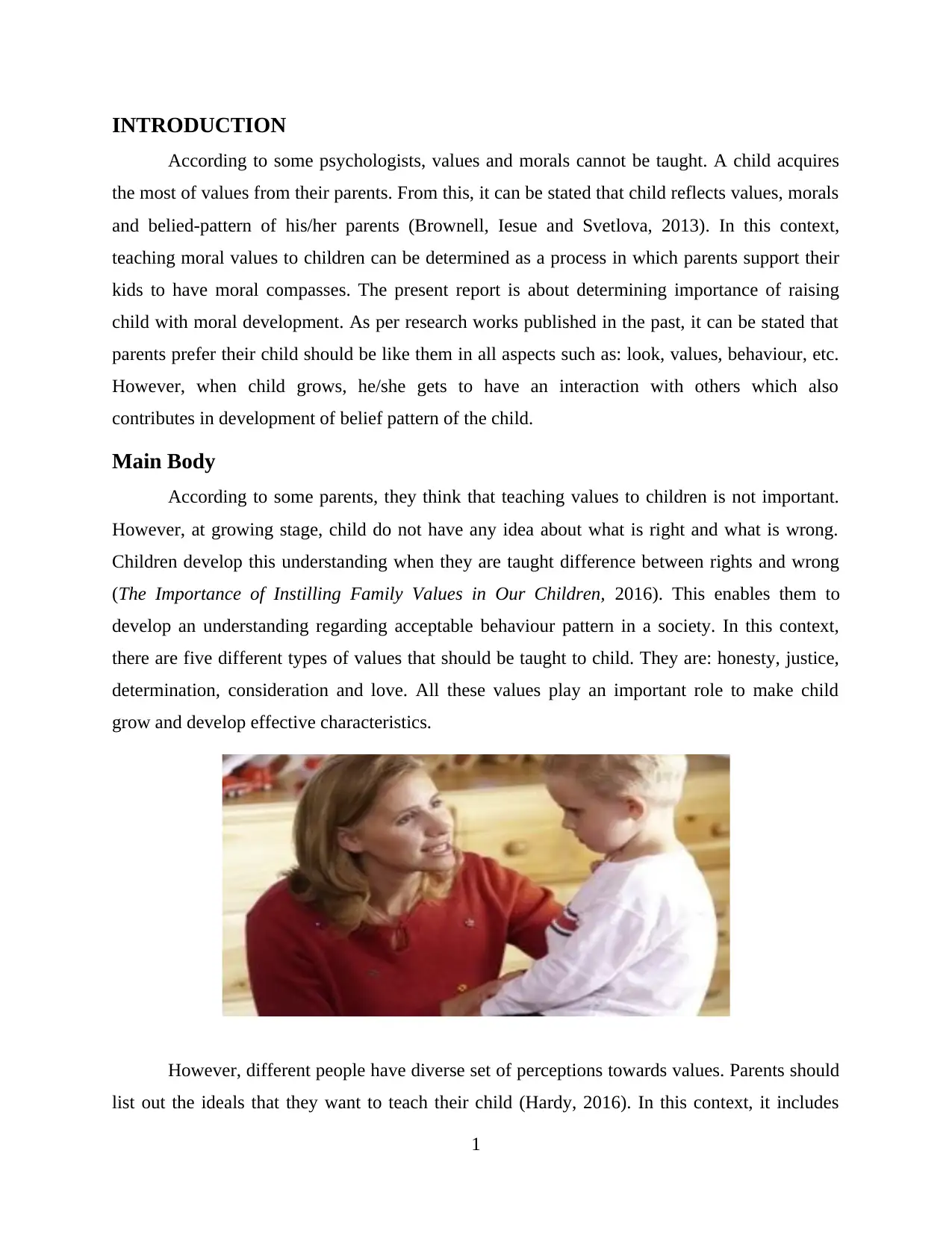
INTRODUCTION
According to some psychologists, values and morals cannot be taught. A child acquires
the most of values from their parents. From this, it can be stated that child reflects values, morals
and belied-pattern of his/her parents (Brownell, Iesue and Svetlova, 2013). In this context,
teaching moral values to children can be determined as a process in which parents support their
kids to have moral compasses. The present report is about determining importance of raising
child with moral development. As per research works published in the past, it can be stated that
parents prefer their child should be like them in all aspects such as: look, values, behaviour, etc.
However, when child grows, he/she gets to have an interaction with others which also
contributes in development of belief pattern of the child.
Main Body
According to some parents, they think that teaching values to children is not important.
However, at growing stage, child do not have any idea about what is right and what is wrong.
Children develop this understanding when they are taught difference between rights and wrong
(The Importance of Instilling Family Values in Our Children, 2016). This enables them to
develop an understanding regarding acceptable behaviour pattern in a society. In this context,
there are five different types of values that should be taught to child. They are: honesty, justice,
determination, consideration and love. All these values play an important role to make child
grow and develop effective characteristics.
However, different people have diverse set of perceptions towards values. Parents should
list out the ideals that they want to teach their child (Hardy, 2016). In this context, it includes
1
According to some psychologists, values and morals cannot be taught. A child acquires
the most of values from their parents. From this, it can be stated that child reflects values, morals
and belied-pattern of his/her parents (Brownell, Iesue and Svetlova, 2013). In this context,
teaching moral values to children can be determined as a process in which parents support their
kids to have moral compasses. The present report is about determining importance of raising
child with moral development. As per research works published in the past, it can be stated that
parents prefer their child should be like them in all aspects such as: look, values, behaviour, etc.
However, when child grows, he/she gets to have an interaction with others which also
contributes in development of belief pattern of the child.
Main Body
According to some parents, they think that teaching values to children is not important.
However, at growing stage, child do not have any idea about what is right and what is wrong.
Children develop this understanding when they are taught difference between rights and wrong
(The Importance of Instilling Family Values in Our Children, 2016). This enables them to
develop an understanding regarding acceptable behaviour pattern in a society. In this context,
there are five different types of values that should be taught to child. They are: honesty, justice,
determination, consideration and love. All these values play an important role to make child
grow and develop effective characteristics.
However, different people have diverse set of perceptions towards values. Parents should
list out the ideals that they want to teach their child (Hardy, 2016). In this context, it includes
1
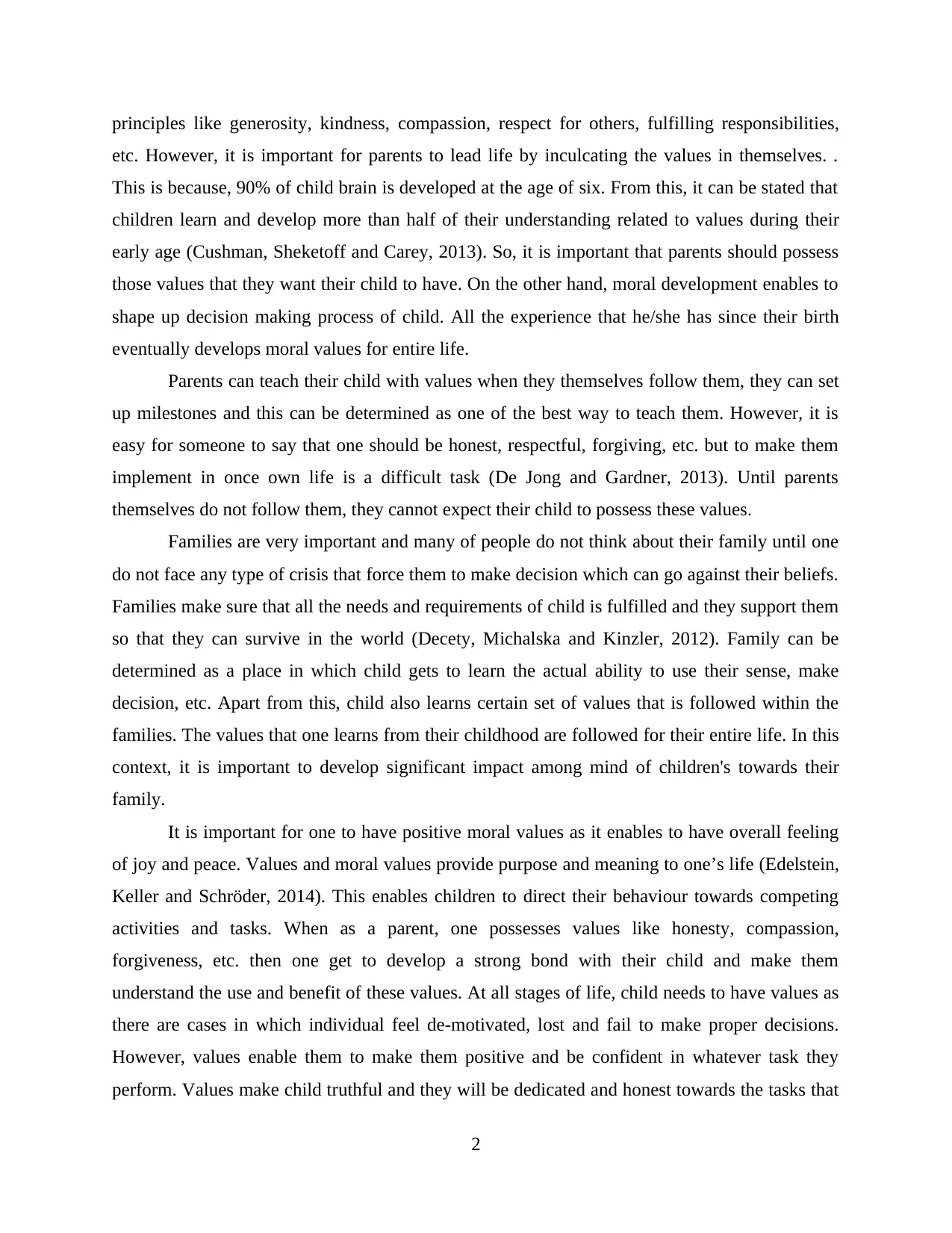
principles like generosity, kindness, compassion, respect for others, fulfilling responsibilities,
etc. However, it is important for parents to lead life by inculcating the values in themselves. .
This is because, 90% of child brain is developed at the age of six. From this, it can be stated that
children learn and develop more than half of their understanding related to values during their
early age (Cushman, Sheketoff and Carey, 2013). So, it is important that parents should possess
those values that they want their child to have. On the other hand, moral development enables to
shape up decision making process of child. All the experience that he/she has since their birth
eventually develops moral values for entire life.
Parents can teach their child with values when they themselves follow them, they can set
up milestones and this can be determined as one of the best way to teach them. However, it is
easy for someone to say that one should be honest, respectful, forgiving, etc. but to make them
implement in once own life is a difficult task (De Jong and Gardner, 2013). Until parents
themselves do not follow them, they cannot expect their child to possess these values.
Families are very important and many of people do not think about their family until one
do not face any type of crisis that force them to make decision which can go against their beliefs.
Families make sure that all the needs and requirements of child is fulfilled and they support them
so that they can survive in the world (Decety, Michalska and Kinzler, 2012). Family can be
determined as a place in which child gets to learn the actual ability to use their sense, make
decision, etc. Apart from this, child also learns certain set of values that is followed within the
families. The values that one learns from their childhood are followed for their entire life. In this
context, it is important to develop significant impact among mind of children's towards their
family.
It is important for one to have positive moral values as it enables to have overall feeling
of joy and peace. Values and moral values provide purpose and meaning to one’s life (Edelstein,
Keller and Schröder, 2014). This enables children to direct their behaviour towards competing
activities and tasks. When as a parent, one possesses values like honesty, compassion,
forgiveness, etc. then one get to develop a strong bond with their child and make them
understand the use and benefit of these values. At all stages of life, child needs to have values as
there are cases in which individual feel de-motivated, lost and fail to make proper decisions.
However, values enable them to make them positive and be confident in whatever task they
perform. Values make child truthful and they will be dedicated and honest towards the tasks that
2
etc. However, it is important for parents to lead life by inculcating the values in themselves. .
This is because, 90% of child brain is developed at the age of six. From this, it can be stated that
children learn and develop more than half of their understanding related to values during their
early age (Cushman, Sheketoff and Carey, 2013). So, it is important that parents should possess
those values that they want their child to have. On the other hand, moral development enables to
shape up decision making process of child. All the experience that he/she has since their birth
eventually develops moral values for entire life.
Parents can teach their child with values when they themselves follow them, they can set
up milestones and this can be determined as one of the best way to teach them. However, it is
easy for someone to say that one should be honest, respectful, forgiving, etc. but to make them
implement in once own life is a difficult task (De Jong and Gardner, 2013). Until parents
themselves do not follow them, they cannot expect their child to possess these values.
Families are very important and many of people do not think about their family until one
do not face any type of crisis that force them to make decision which can go against their beliefs.
Families make sure that all the needs and requirements of child is fulfilled and they support them
so that they can survive in the world (Decety, Michalska and Kinzler, 2012). Family can be
determined as a place in which child gets to learn the actual ability to use their sense, make
decision, etc. Apart from this, child also learns certain set of values that is followed within the
families. The values that one learns from their childhood are followed for their entire life. In this
context, it is important to develop significant impact among mind of children's towards their
family.
It is important for one to have positive moral values as it enables to have overall feeling
of joy and peace. Values and moral values provide purpose and meaning to one’s life (Edelstein,
Keller and Schröder, 2014). This enables children to direct their behaviour towards competing
activities and tasks. When as a parent, one possesses values like honesty, compassion,
forgiveness, etc. then one get to develop a strong bond with their child and make them
understand the use and benefit of these values. At all stages of life, child needs to have values as
there are cases in which individual feel de-motivated, lost and fail to make proper decisions.
However, values enable them to make them positive and be confident in whatever task they
perform. Values make child truthful and they will be dedicated and honest towards the tasks that
2
⊘ This is a preview!⊘
Do you want full access?
Subscribe today to unlock all pages.

Trusted by 1+ million students worldwide
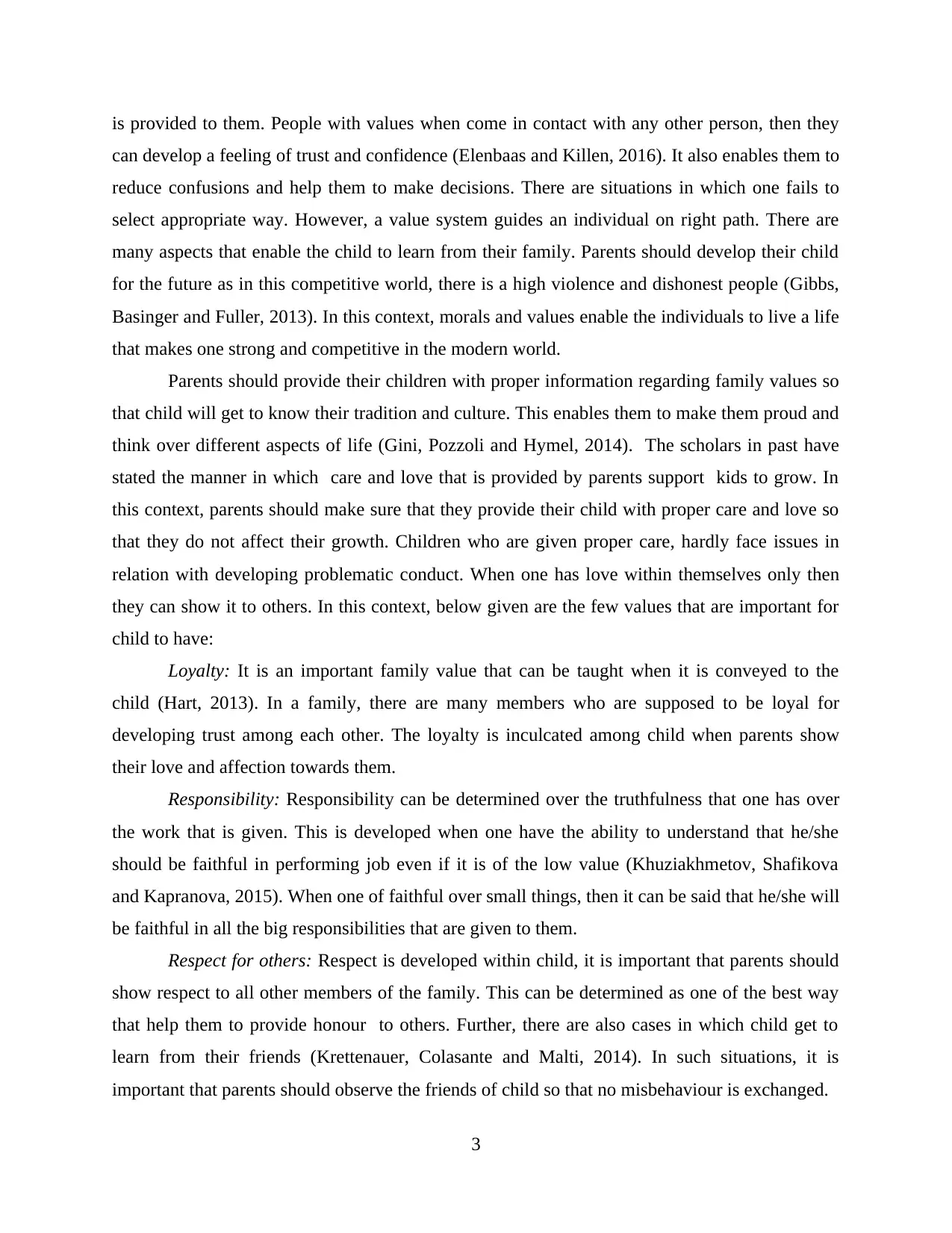
is provided to them. People with values when come in contact with any other person, then they
can develop a feeling of trust and confidence (Elenbaas and Killen, 2016). It also enables them to
reduce confusions and help them to make decisions. There are situations in which one fails to
select appropriate way. However, a value system guides an individual on right path. There are
many aspects that enable the child to learn from their family. Parents should develop their child
for the future as in this competitive world, there is a high violence and dishonest people (Gibbs,
Basinger and Fuller, 2013). In this context, morals and values enable the individuals to live a life
that makes one strong and competitive in the modern world.
Parents should provide their children with proper information regarding family values so
that child will get to know their tradition and culture. This enables them to make them proud and
think over different aspects of life (Gini, Pozzoli and Hymel, 2014). The scholars in past have
stated the manner in which care and love that is provided by parents support kids to grow. In
this context, parents should make sure that they provide their child with proper care and love so
that they do not affect their growth. Children who are given proper care, hardly face issues in
relation with developing problematic conduct. When one has love within themselves only then
they can show it to others. In this context, below given are the few values that are important for
child to have:
Loyalty: It is an important family value that can be taught when it is conveyed to the
child (Hart, 2013). In a family, there are many members who are supposed to be loyal for
developing trust among each other. The loyalty is inculcated among child when parents show
their love and affection towards them.
Responsibility: Responsibility can be determined over the truthfulness that one has over
the work that is given. This is developed when one have the ability to understand that he/she
should be faithful in performing job even if it is of the low value (Khuziakhmetov, Shafikova
and Kapranova, 2015). When one of faithful over small things, then it can be said that he/she will
be faithful in all the big responsibilities that are given to them.
Respect for others: Respect is developed within child, it is important that parents should
show respect to all other members of the family. This can be determined as one of the best way
that help them to provide honour to others. Further, there are also cases in which child get to
learn from their friends (Krettenauer, Colasante and Malti, 2014). In such situations, it is
important that parents should observe the friends of child so that no misbehaviour is exchanged.
3
can develop a feeling of trust and confidence (Elenbaas and Killen, 2016). It also enables them to
reduce confusions and help them to make decisions. There are situations in which one fails to
select appropriate way. However, a value system guides an individual on right path. There are
many aspects that enable the child to learn from their family. Parents should develop their child
for the future as in this competitive world, there is a high violence and dishonest people (Gibbs,
Basinger and Fuller, 2013). In this context, morals and values enable the individuals to live a life
that makes one strong and competitive in the modern world.
Parents should provide their children with proper information regarding family values so
that child will get to know their tradition and culture. This enables them to make them proud and
think over different aspects of life (Gini, Pozzoli and Hymel, 2014). The scholars in past have
stated the manner in which care and love that is provided by parents support kids to grow. In
this context, parents should make sure that they provide their child with proper care and love so
that they do not affect their growth. Children who are given proper care, hardly face issues in
relation with developing problematic conduct. When one has love within themselves only then
they can show it to others. In this context, below given are the few values that are important for
child to have:
Loyalty: It is an important family value that can be taught when it is conveyed to the
child (Hart, 2013). In a family, there are many members who are supposed to be loyal for
developing trust among each other. The loyalty is inculcated among child when parents show
their love and affection towards them.
Responsibility: Responsibility can be determined over the truthfulness that one has over
the work that is given. This is developed when one have the ability to understand that he/she
should be faithful in performing job even if it is of the low value (Khuziakhmetov, Shafikova
and Kapranova, 2015). When one of faithful over small things, then it can be said that he/she will
be faithful in all the big responsibilities that are given to them.
Respect for others: Respect is developed within child, it is important that parents should
show respect to all other members of the family. This can be determined as one of the best way
that help them to provide honour to others. Further, there are also cases in which child get to
learn from their friends (Krettenauer, Colasante and Malti, 2014). In such situations, it is
important that parents should observe the friends of child so that no misbehaviour is exchanged.
3
Paraphrase This Document
Need a fresh take? Get an instant paraphrase of this document with our AI Paraphraser
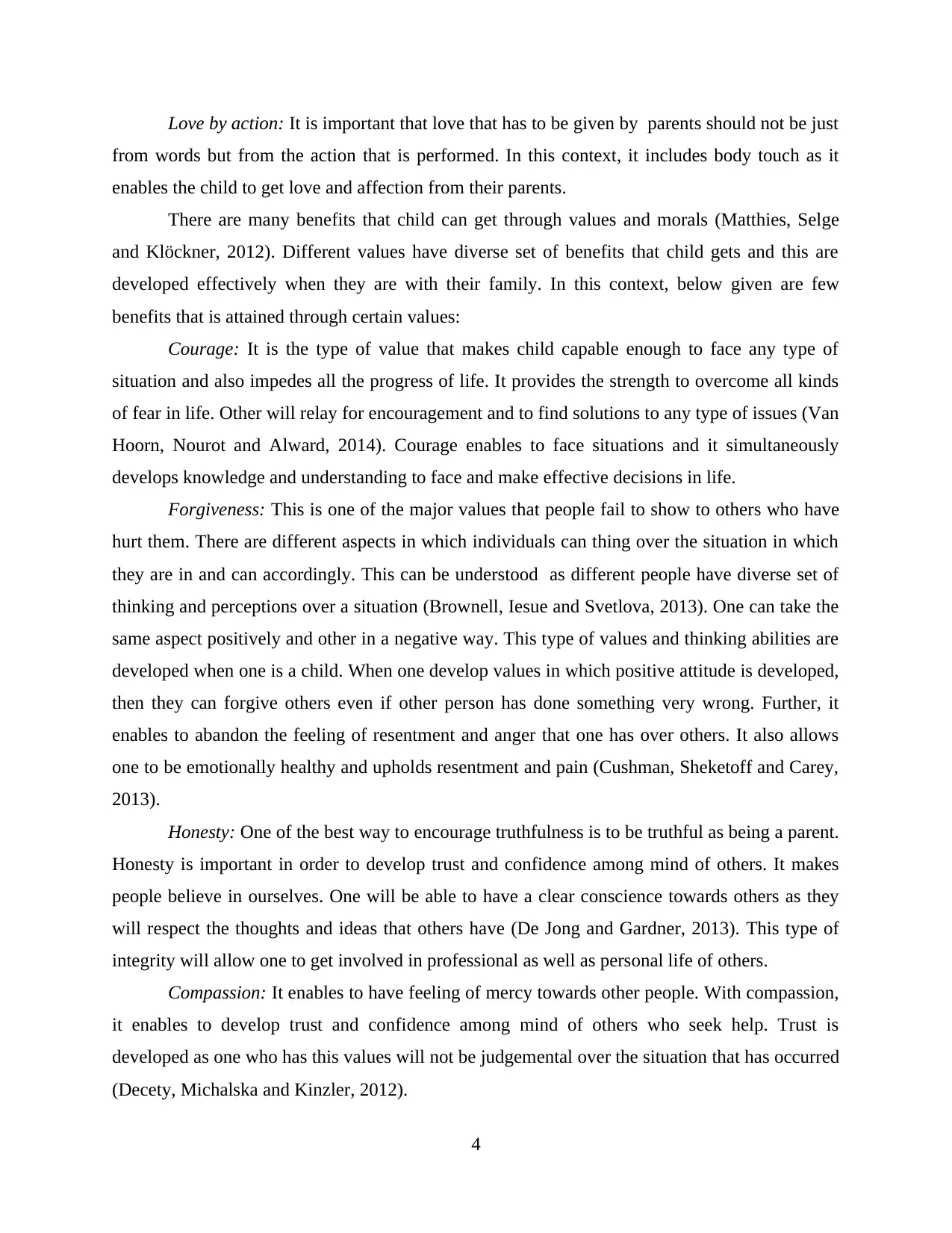
Love by action: It is important that love that has to be given by parents should not be just
from words but from the action that is performed. In this context, it includes body touch as it
enables the child to get love and affection from their parents.
There are many benefits that child can get through values and morals (Matthies, Selge
and Klöckner, 2012). Different values have diverse set of benefits that child gets and this are
developed effectively when they are with their family. In this context, below given are few
benefits that is attained through certain values:
Courage: It is the type of value that makes child capable enough to face any type of
situation and also impedes all the progress of life. It provides the strength to overcome all kinds
of fear in life. Other will relay for encouragement and to find solutions to any type of issues (Van
Hoorn, Nourot and Alward, 2014). Courage enables to face situations and it simultaneously
develops knowledge and understanding to face and make effective decisions in life.
Forgiveness: This is one of the major values that people fail to show to others who have
hurt them. There are different aspects in which individuals can thing over the situation in which
they are in and can accordingly. This can be understood as different people have diverse set of
thinking and perceptions over a situation (Brownell, Iesue and Svetlova, 2013). One can take the
same aspect positively and other in a negative way. This type of values and thinking abilities are
developed when one is a child. When one develop values in which positive attitude is developed,
then they can forgive others even if other person has done something very wrong. Further, it
enables to abandon the feeling of resentment and anger that one has over others. It also allows
one to be emotionally healthy and upholds resentment and pain (Cushman, Sheketoff and Carey,
2013).
Honesty: One of the best way to encourage truthfulness is to be truthful as being a parent.
Honesty is important in order to develop trust and confidence among mind of others. It makes
people believe in ourselves. One will be able to have a clear conscience towards others as they
will respect the thoughts and ideas that others have (De Jong and Gardner, 2013). This type of
integrity will allow one to get involved in professional as well as personal life of others.
Compassion: It enables to have feeling of mercy towards other people. With compassion,
it enables to develop trust and confidence among mind of others who seek help. Trust is
developed as one who has this values will not be judgemental over the situation that has occurred
(Decety, Michalska and Kinzler, 2012).
4
from words but from the action that is performed. In this context, it includes body touch as it
enables the child to get love and affection from their parents.
There are many benefits that child can get through values and morals (Matthies, Selge
and Klöckner, 2012). Different values have diverse set of benefits that child gets and this are
developed effectively when they are with their family. In this context, below given are few
benefits that is attained through certain values:
Courage: It is the type of value that makes child capable enough to face any type of
situation and also impedes all the progress of life. It provides the strength to overcome all kinds
of fear in life. Other will relay for encouragement and to find solutions to any type of issues (Van
Hoorn, Nourot and Alward, 2014). Courage enables to face situations and it simultaneously
develops knowledge and understanding to face and make effective decisions in life.
Forgiveness: This is one of the major values that people fail to show to others who have
hurt them. There are different aspects in which individuals can thing over the situation in which
they are in and can accordingly. This can be understood as different people have diverse set of
thinking and perceptions over a situation (Brownell, Iesue and Svetlova, 2013). One can take the
same aspect positively and other in a negative way. This type of values and thinking abilities are
developed when one is a child. When one develop values in which positive attitude is developed,
then they can forgive others even if other person has done something very wrong. Further, it
enables to abandon the feeling of resentment and anger that one has over others. It also allows
one to be emotionally healthy and upholds resentment and pain (Cushman, Sheketoff and Carey,
2013).
Honesty: One of the best way to encourage truthfulness is to be truthful as being a parent.
Honesty is important in order to develop trust and confidence among mind of others. It makes
people believe in ourselves. One will be able to have a clear conscience towards others as they
will respect the thoughts and ideas that others have (De Jong and Gardner, 2013). This type of
integrity will allow one to get involved in professional as well as personal life of others.
Compassion: It enables to have feeling of mercy towards other people. With compassion,
it enables to develop trust and confidence among mind of others who seek help. Trust is
developed as one who has this values will not be judgemental over the situation that has occurred
(Decety, Michalska and Kinzler, 2012).
4
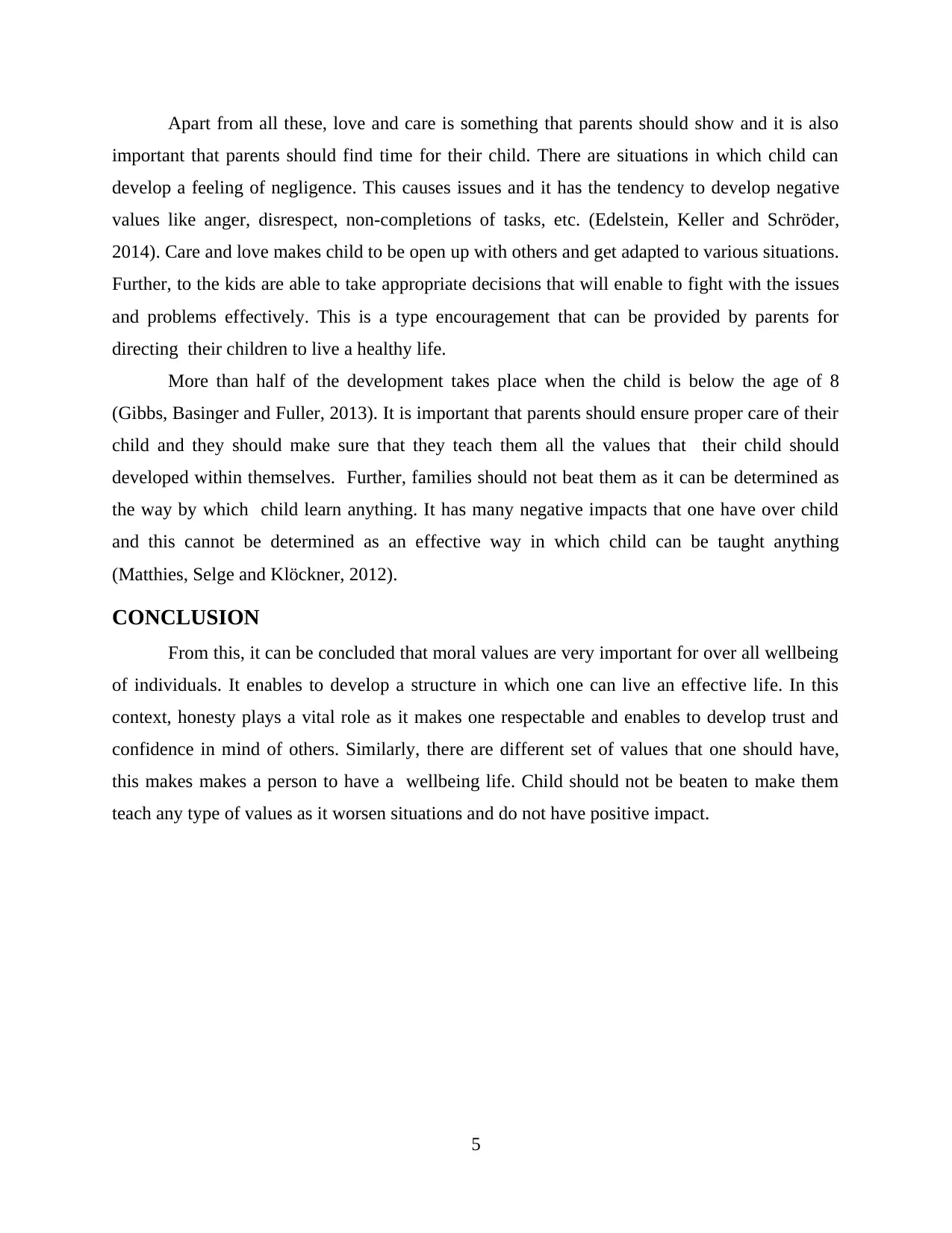
Apart from all these, love and care is something that parents should show and it is also
important that parents should find time for their child. There are situations in which child can
develop a feeling of negligence. This causes issues and it has the tendency to develop negative
values like anger, disrespect, non-completions of tasks, etc. (Edelstein, Keller and Schröder,
2014). Care and love makes child to be open up with others and get adapted to various situations.
Further, to the kids are able to take appropriate decisions that will enable to fight with the issues
and problems effectively. This is a type encouragement that can be provided by parents for
directing their children to live a healthy life.
More than half of the development takes place when the child is below the age of 8
(Gibbs, Basinger and Fuller, 2013). It is important that parents should ensure proper care of their
child and they should make sure that they teach them all the values that their child should
developed within themselves. Further, families should not beat them as it can be determined as
the way by which child learn anything. It has many negative impacts that one have over child
and this cannot be determined as an effective way in which child can be taught anything
(Matthies, Selge and Klöckner, 2012).
CONCLUSION
From this, it can be concluded that moral values are very important for over all wellbeing
of individuals. It enables to develop a structure in which one can live an effective life. In this
context, honesty plays a vital role as it makes one respectable and enables to develop trust and
confidence in mind of others. Similarly, there are different set of values that one should have,
this makes makes a person to have a wellbeing life. Child should not be beaten to make them
teach any type of values as it worsen situations and do not have positive impact.
5
important that parents should find time for their child. There are situations in which child can
develop a feeling of negligence. This causes issues and it has the tendency to develop negative
values like anger, disrespect, non-completions of tasks, etc. (Edelstein, Keller and Schröder,
2014). Care and love makes child to be open up with others and get adapted to various situations.
Further, to the kids are able to take appropriate decisions that will enable to fight with the issues
and problems effectively. This is a type encouragement that can be provided by parents for
directing their children to live a healthy life.
More than half of the development takes place when the child is below the age of 8
(Gibbs, Basinger and Fuller, 2013). It is important that parents should ensure proper care of their
child and they should make sure that they teach them all the values that their child should
developed within themselves. Further, families should not beat them as it can be determined as
the way by which child learn anything. It has many negative impacts that one have over child
and this cannot be determined as an effective way in which child can be taught anything
(Matthies, Selge and Klöckner, 2012).
CONCLUSION
From this, it can be concluded that moral values are very important for over all wellbeing
of individuals. It enables to develop a structure in which one can live an effective life. In this
context, honesty plays a vital role as it makes one respectable and enables to develop trust and
confidence in mind of others. Similarly, there are different set of values that one should have,
this makes makes a person to have a wellbeing life. Child should not be beaten to make them
teach any type of values as it worsen situations and do not have positive impact.
5
⊘ This is a preview!⊘
Do you want full access?
Subscribe today to unlock all pages.

Trusted by 1+ million students worldwide
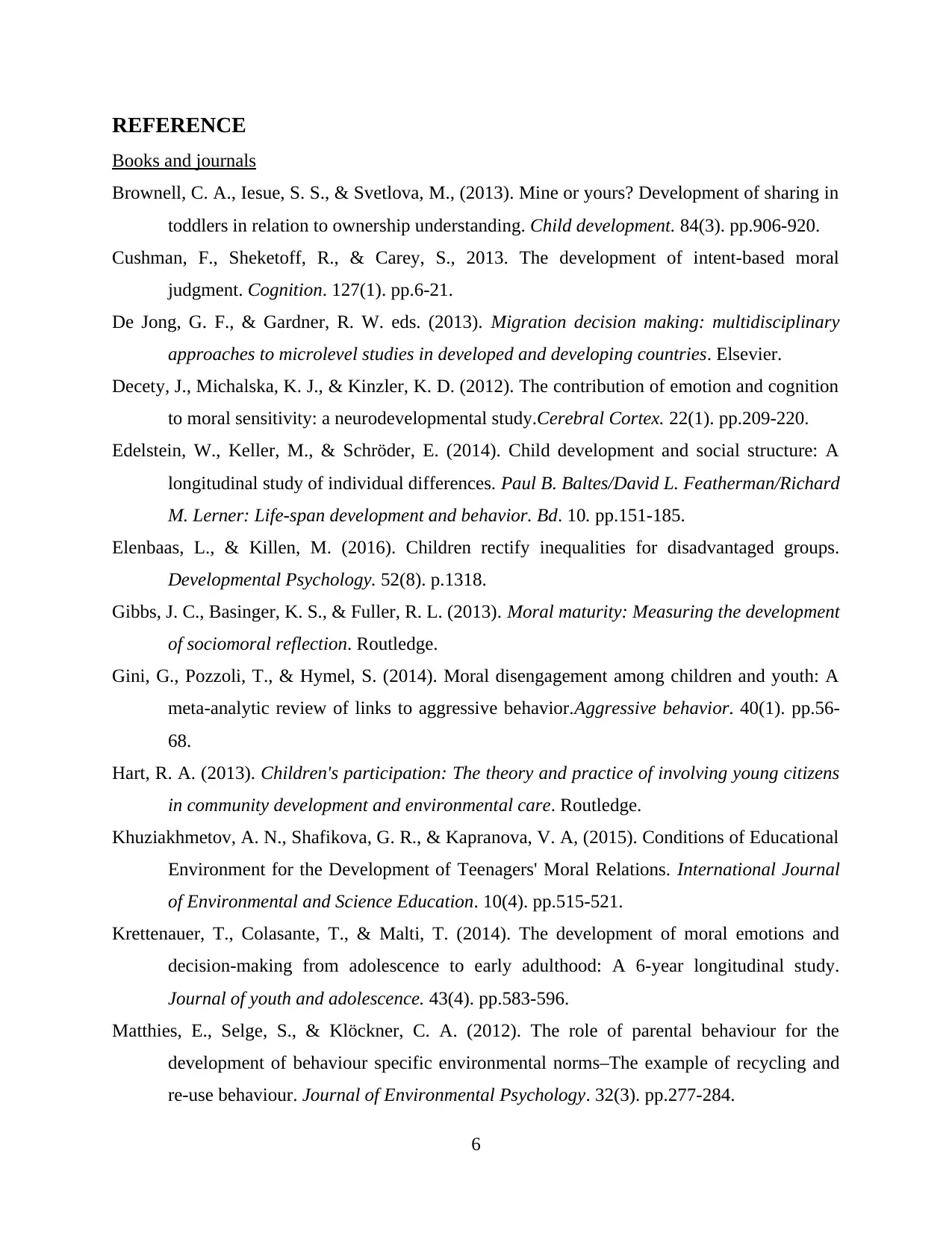
REFERENCE
Books and journals
Brownell, C. A., Iesue, S. S., & Svetlova, M., (2013). Mine or yours? Development of sharing in
toddlers in relation to ownership understanding. Child development. 84(3). pp.906-920.
Cushman, F., Sheketoff, R., & Carey, S., 2013. The development of intent-based moral
judgment. Cognition. 127(1). pp.6-21.
De Jong, G. F., & Gardner, R. W. eds. (2013). Migration decision making: multidisciplinary
approaches to microlevel studies in developed and developing countries. Elsevier.
Decety, J., Michalska, K. J., & Kinzler, K. D. (2012). The contribution of emotion and cognition
to moral sensitivity: a neurodevelopmental study.Cerebral Cortex. 22(1). pp.209-220.
Edelstein, W., Keller, M., & Schröder, E. (2014). Child development and social structure: A
longitudinal study of individual differences. Paul B. Baltes/David L. Featherman/Richard
M. Lerner: Life-span development and behavior. Bd. 10. pp.151-185.
Elenbaas, L., & Killen, M. (2016). Children rectify inequalities for disadvantaged groups.
Developmental Psychology. 52(8). p.1318.
Gibbs, J. C., Basinger, K. S., & Fuller, R. L. (2013). Moral maturity: Measuring the development
of sociomoral reflection. Routledge.
Gini, G., Pozzoli, T., & Hymel, S. (2014). Moral disengagement among children and youth: A
meta‐analytic review of links to aggressive behavior.Aggressive behavior. 40(1). pp.56-
68.
Hart, R. A. (2013). Children's participation: The theory and practice of involving young citizens
in community development and environmental care. Routledge.
Khuziakhmetov, A. N., Shafikova, G. R., & Kapranova, V. A, (2015). Conditions of Educational
Environment for the Development of Teenagers' Moral Relations. International Journal
of Environmental and Science Education. 10(4). pp.515-521.
Krettenauer, T., Colasante, T., & Malti, T. (2014). The development of moral emotions and
decision-making from adolescence to early adulthood: A 6-year longitudinal study.
Journal of youth and adolescence. 43(4). pp.583-596.
Matthies, E., Selge, S., & Klöckner, C. A. (2012). The role of parental behaviour for the
development of behaviour specific environmental norms–The example of recycling and
re-use behaviour. Journal of Environmental Psychology. 32(3). pp.277-284.
6
Books and journals
Brownell, C. A., Iesue, S. S., & Svetlova, M., (2013). Mine or yours? Development of sharing in
toddlers in relation to ownership understanding. Child development. 84(3). pp.906-920.
Cushman, F., Sheketoff, R., & Carey, S., 2013. The development of intent-based moral
judgment. Cognition. 127(1). pp.6-21.
De Jong, G. F., & Gardner, R. W. eds. (2013). Migration decision making: multidisciplinary
approaches to microlevel studies in developed and developing countries. Elsevier.
Decety, J., Michalska, K. J., & Kinzler, K. D. (2012). The contribution of emotion and cognition
to moral sensitivity: a neurodevelopmental study.Cerebral Cortex. 22(1). pp.209-220.
Edelstein, W., Keller, M., & Schröder, E. (2014). Child development and social structure: A
longitudinal study of individual differences. Paul B. Baltes/David L. Featherman/Richard
M. Lerner: Life-span development and behavior. Bd. 10. pp.151-185.
Elenbaas, L., & Killen, M. (2016). Children rectify inequalities for disadvantaged groups.
Developmental Psychology. 52(8). p.1318.
Gibbs, J. C., Basinger, K. S., & Fuller, R. L. (2013). Moral maturity: Measuring the development
of sociomoral reflection. Routledge.
Gini, G., Pozzoli, T., & Hymel, S. (2014). Moral disengagement among children and youth: A
meta‐analytic review of links to aggressive behavior.Aggressive behavior. 40(1). pp.56-
68.
Hart, R. A. (2013). Children's participation: The theory and practice of involving young citizens
in community development and environmental care. Routledge.
Khuziakhmetov, A. N., Shafikova, G. R., & Kapranova, V. A, (2015). Conditions of Educational
Environment for the Development of Teenagers' Moral Relations. International Journal
of Environmental and Science Education. 10(4). pp.515-521.
Krettenauer, T., Colasante, T., & Malti, T. (2014). The development of moral emotions and
decision-making from adolescence to early adulthood: A 6-year longitudinal study.
Journal of youth and adolescence. 43(4). pp.583-596.
Matthies, E., Selge, S., & Klöckner, C. A. (2012). The role of parental behaviour for the
development of behaviour specific environmental norms–The example of recycling and
re-use behaviour. Journal of Environmental Psychology. 32(3). pp.277-284.
6
Paraphrase This Document
Need a fresh take? Get an instant paraphrase of this document with our AI Paraphraser
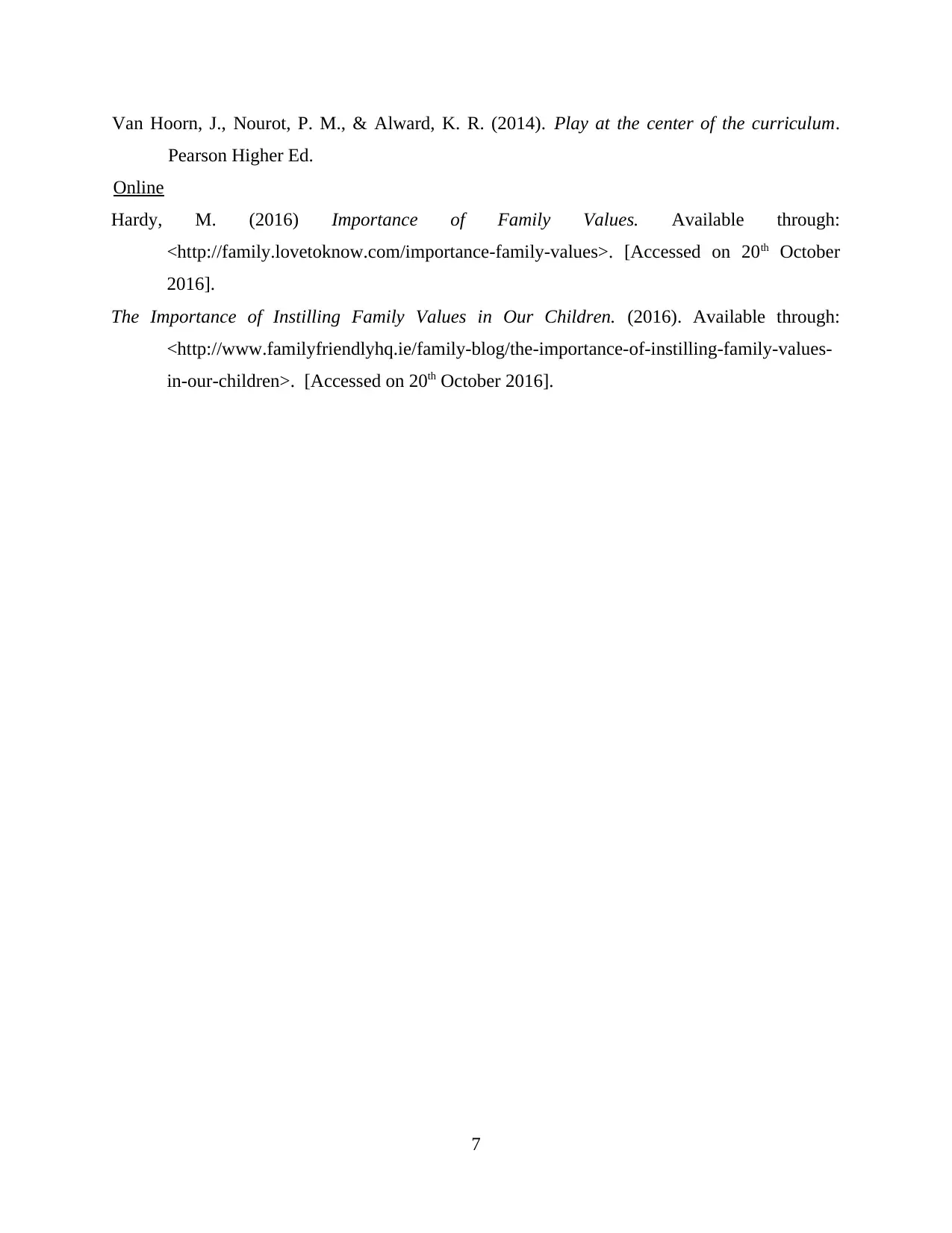
Van Hoorn, J., Nourot, P. M., & Alward, K. R. (2014). Play at the center of the curriculum.
Pearson Higher Ed.
Online
Hardy, M. (2016) Importance of Family Values. Available through:
<http://family.lovetoknow.com/importance-family-values>. [Accessed on 20th October
2016].
The Importance of Instilling Family Values in Our Children. (2016). Available through:
<http://www.familyfriendlyhq.ie/family-blog/the-importance-of-instilling-family-values-
in-our-children>. [Accessed on 20th October 2016].
7
Pearson Higher Ed.
Online
Hardy, M. (2016) Importance of Family Values. Available through:
<http://family.lovetoknow.com/importance-family-values>. [Accessed on 20th October
2016].
The Importance of Instilling Family Values in Our Children. (2016). Available through:
<http://www.familyfriendlyhq.ie/family-blog/the-importance-of-instilling-family-values-
in-our-children>. [Accessed on 20th October 2016].
7
1 out of 8
Related Documents
Your All-in-One AI-Powered Toolkit for Academic Success.
+13062052269
info@desklib.com
Available 24*7 on WhatsApp / Email
![[object Object]](/_next/static/media/star-bottom.7253800d.svg)
Unlock your academic potential
Copyright © 2020–2026 A2Z Services. All Rights Reserved. Developed and managed by ZUCOL.





